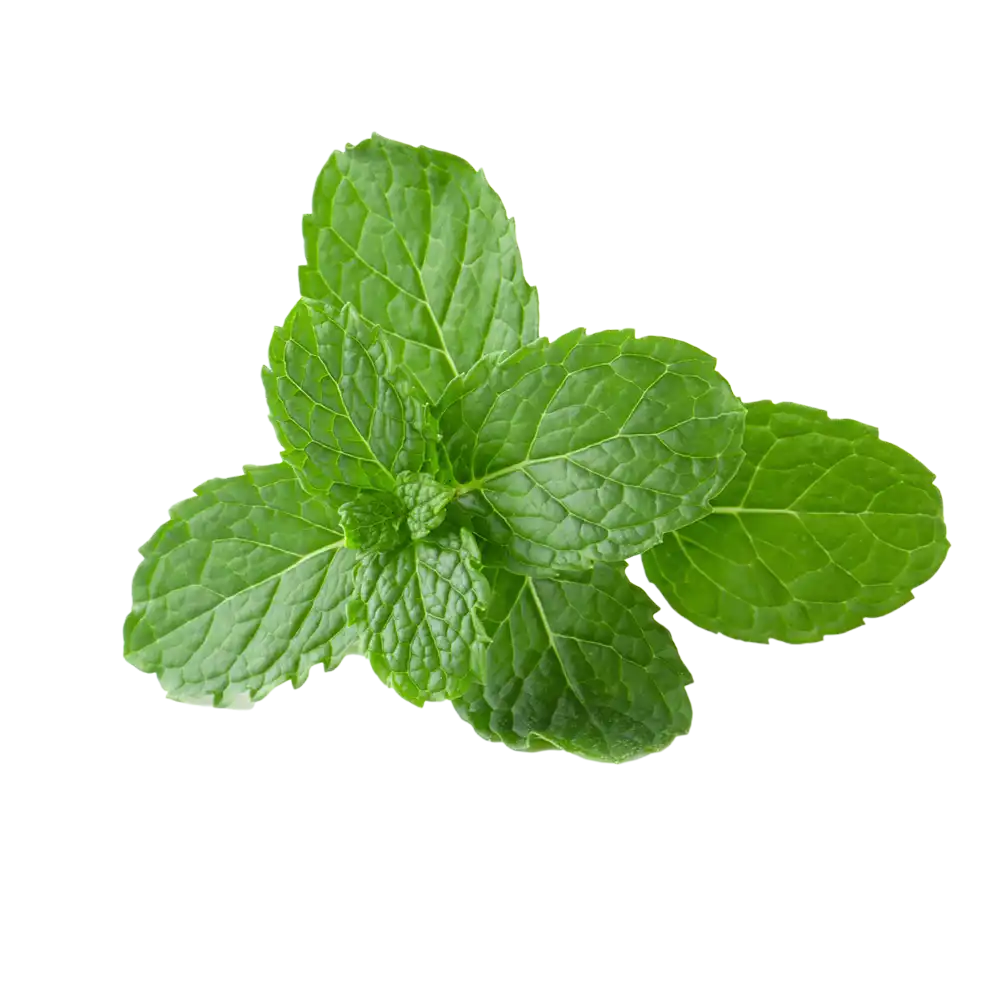Peppermint essential oil
Mentha piperita
Peppermint essential oil, derived from the leaves of the peppermint plant (Mentha piperita), is one of the most versatile and widely used essential oils. Known for its refreshing aroma and cooling properties, this oil has been valued for centuries in various cultures for its medicinal, culinary, and spiritual benefits. Whether it’s used for soothing digestive issues, relieving headaches, or simply freshening the air, peppermint essential oil has a broad range of applications that make it an essential part of any natural wellness toolkit.
History of Peppermint Essential Oil
The use of peppermint dates back to ancient civilizations. Records show that peppermint was used in Ancient Egypt as early as 1000 BC, where it was found in pyramids and used for both culinary and medicinal purposes. The Greeks and Romans also appreciated peppermint, using it as a remedy for indigestion and to flavor food and beverages.
In medieval Europe, peppermint gained popularity for its therapeutic properties. Herbalists used it to treat a variety of ailments, from colds and headaches to digestive disorders. By the 18th century, peppermint essential oil became widely distilled and traded, solidifying its role in traditional medicine.

Scent description
Minty, fresh, grassy
Usage
Inhaled | topically | internally
Effects, use cases
Anti-inflammatory | analgesic | antispasmodic | warming | invigorating | cooling | expectorant | stimulant | fatigue | fever | hot flashes | burns | memory loss | food cravings | muscle pain | allergies | headaches | migraines | bad breath | asthma | loss of smell | stomach ache | nausea
Disclaimer: always check the manufacturer's recommendation before using any essential oils internally or topically!
Warning, safety cautions
Essential oils are not intended to diagnose, treat, or prevent any disease, nor do they replace medications or therapies prescribed by a physician. They are not medicinal products and do not qualify as drugs. Based on experience, essential oils may have complementary therapeutic effects. If you are unsure about how an essential oil might affect you or your child, consult your general practitioner and/or a qualified aromatherapist. Before using any new essential oil (especially internally or directly on the skin), perform a patch test.
Use and health effects of peppermint essential oil
Peppermint essential oil offers numerous medicinal benefits due to its high menthol content.
Relief for Digestive Issues
Peppermint essential oil is well-known for its ability to soothe digestive discomfort. Its antispasmodic properties help relax the muscles of the gastrointestinal tract, making it effective in treating conditions like irritable bowel syndrome (IBS), indigestion, and bloating. A few drops of diluted peppermint oil massaged onto the abdomen can provide quick relief from stomach cramps.
Headache and Migraine Relief
Applying diluted peppermint essential oil to the temples and the back of the neck can help relieve tension headaches and migraines. The cooling sensation of menthol increases blood flow and reduces muscle contractions, providing a soothing effect.
Respiratory Benefits
Thanks to its decongestant properties, peppermint oil is commonly used to relieve respiratory issues. Inhaling peppermint oil can help clear nasal passages, making it easier to breathe during a cold or allergy season. It also has antibacterial properties that may help fight infections.
Pain Relief
Peppermint essential oil’s cooling effect can help alleviate muscle and joint pain. It works by numbing the affected area and reducing inflammation. Diluting the oil with a carrier oil and massaging it into sore muscles or joints can provide immediate relief.
Boosting Mental Clarity and Focus
The invigorating scent of peppermint essential oil can enhance concentration and improve mental clarity. Diffusing the oil in a room or inhaling it directly can boost energy levels and reduce fatigue, making it ideal for work or study sessions.
Culinary uses
Peppermint leaves have long been used in cooking and beverages, but peppermint essential oil offers a more concentrated flavor. Only a drop or two is needed to enhance dishes and drinks. Peppermint oil can be added to chocolates, cakes, and ice creams for a refreshing twist. A drop of peppermint essential oil in hot water creates a soothing tea, while it can also be used in cocktails or smoothies for a cooling effect. Peppermint oil pairs well with lamb and other meats, adding a bright, minty flavor.

How to use peppermint essential oil?
Mental fatigue, fatigue
Inhale from your palms or apply to the back of your neck.
Burns, sunburn
Mix in carrier oil and apply to the burned area.
Binge eating
Inhale directly from your palms or place 1 drop under your tongue to control hunger.
Allergies
Take 1 drop in an empty capsule or apply directly under your nose, massage into the soles of your feet.
Asthma
Apply to your chest.
Stomach ache, nausea
Take 1 drop in an empty capsule or massage into the stomach area.
Fever, hot flashes
Apply along the spine, the back of your head, or massage into the soles of your feet for a cooling effect.
Memory loss
Apply along the spine, the back of your head, or massage into the soles of your feet.
Muscle pain
Massage into affected area.
Headaches, migraines
Apply to temples, forehead, and nape of neck.
Loss of smell
Inhale directly from your palms or mix with a carrier oil and apply to the bridge of your nose.
Disclaimer: always check the manufacturer's recommendation before using any essential oils internally or topically!
Warning, safety cautions
Essential oils are not intended to diagnose, treat, or prevent any disease, nor do they replace medications or therapies prescribed by a physician. They are not medicinal products and do not qualify as drugs. Based on experience, essential oils may have complementary therapeutic effects. If you are unsure about how an essential oil might affect you or your child, consult your general practitioner and/or a qualified aromatherapist. Before using any new essential oil (especially internally or directly on the skin), perform a patch test.
Peppermint essential oil – spirituality and soul
In addition to its physical benefits, peppermint essential oil has a long history of use in spiritual and emotional practices. Its uplifting scent can help clear negative energy and promote a sense of renewal. Many people use it in meditation to enhance mental clarity and focus. Peppermint oil is also believed to stimulate the throat chakra, promoting clear communication and self-expression. When diffused during spiritual practices, it can help create an environment of peace and focus.
Recommended manufacturers of Peppermint essential oil
dōTERRA
This essential oil is currently available from dōTERRA.
For further information, visit the dōTERRA website.
Young Living
Young Living is currently selling this essential oil.
For further information, visit the Young Living website.
Contact info
Author:
Roseware Kft. - Réka Rózsáné Illés
Affiliate programs
I am open to be the part of affiliate programs with essential oil manufacturers and sellers. Contact me!
Copyright info
Photos and texts on this website are subjects of copyright - the owner of the copyright is Roseware Kft. - Réka Rózsáné Illés. Do not use any of these without permission.
